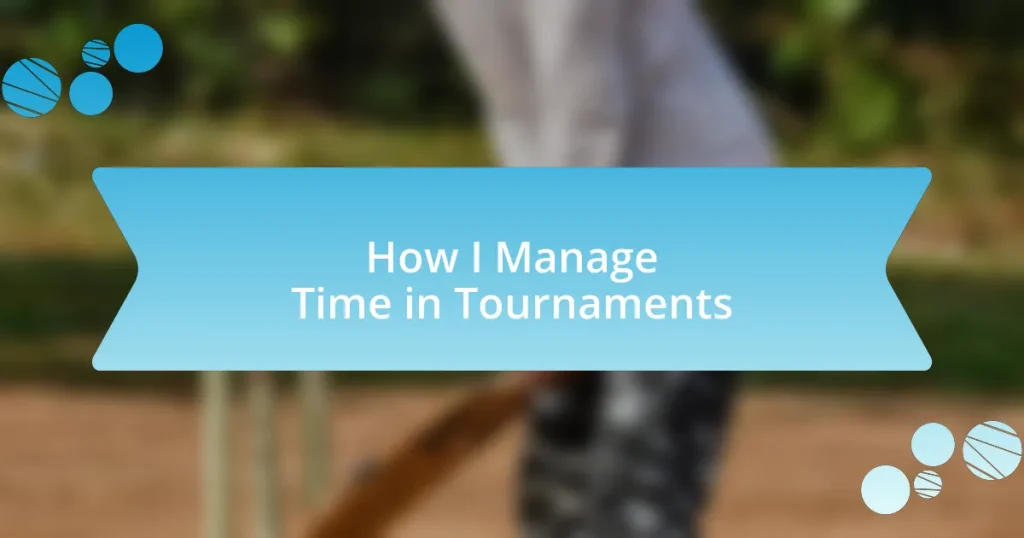Key takeaways:
- Effective tournament time management involves breaking the day into segments and setting mini-goals to stay focused and avoid overwhelm.
- Flexible scheduling and the ability to prioritize tasks based on urgency and importance are crucial for maintaining smooth tournament operations.
- Utilizing time-tracking tools and digital calendars helps organize schedules and allows for reflection on time usage, leading to improved performance in future tournaments.
- Cultivating a distraction-free environment and incorporating short breaks greatly enhances focus during competitive events.
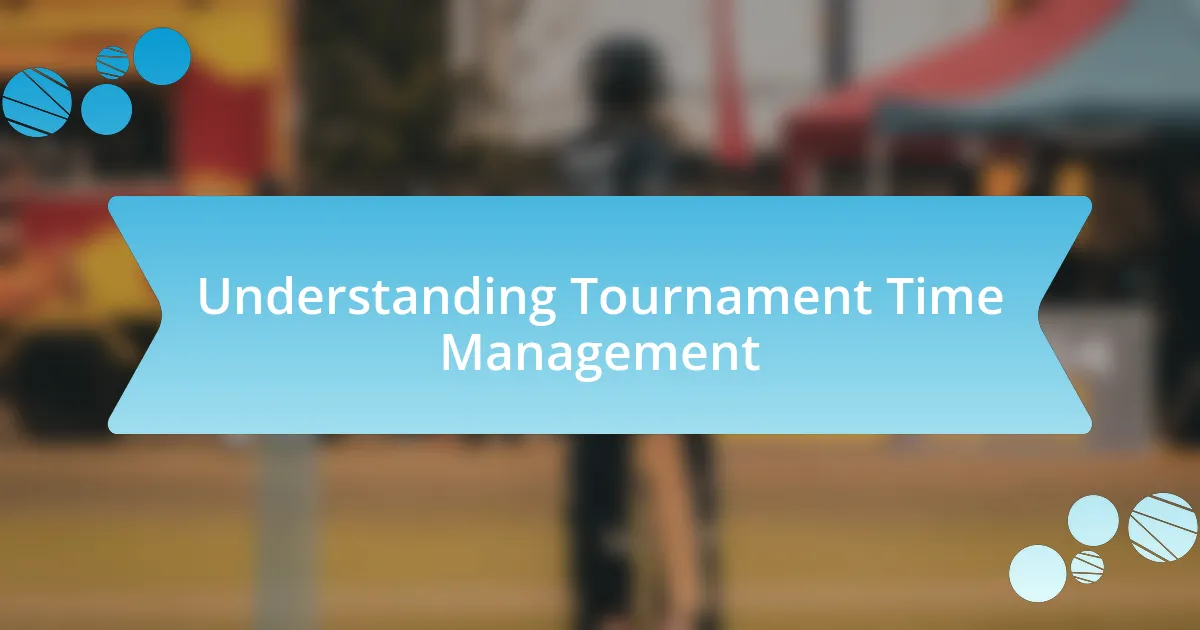
Understanding Tournament Time Management
Managing time in tournaments is a crucial skill I’ve honed over the years. I remember a particular event where I underestimated the time needed for each round. This taught me the importance of allocating adequate time to tasks, and I learned that a simple time tracker can be a game-changer. Have you ever felt the frustration of running out of time just as you were about to make a critical play?
I often find that breaking the tournament day into segments helps me stay focused. By setting mini-goals for each phase of the tournament, such as warm-ups, strategy discussions, and even breaks, I create a rhythm that helps prevent overwhelm. It’s fascinating how a structured approach can ease tension and allow room for enjoyable moments during the competition.
Reflection is key in improving tournament time management. After each event, I take a moment to assess what worked and what didn’t. This personal review process not only informs my strategy for future tournaments but also motivates me to keep refining my skills. Have you taken the time to reflect on your own tournament experiences? You’ll likely discover insights that can significantly enhance your performance.
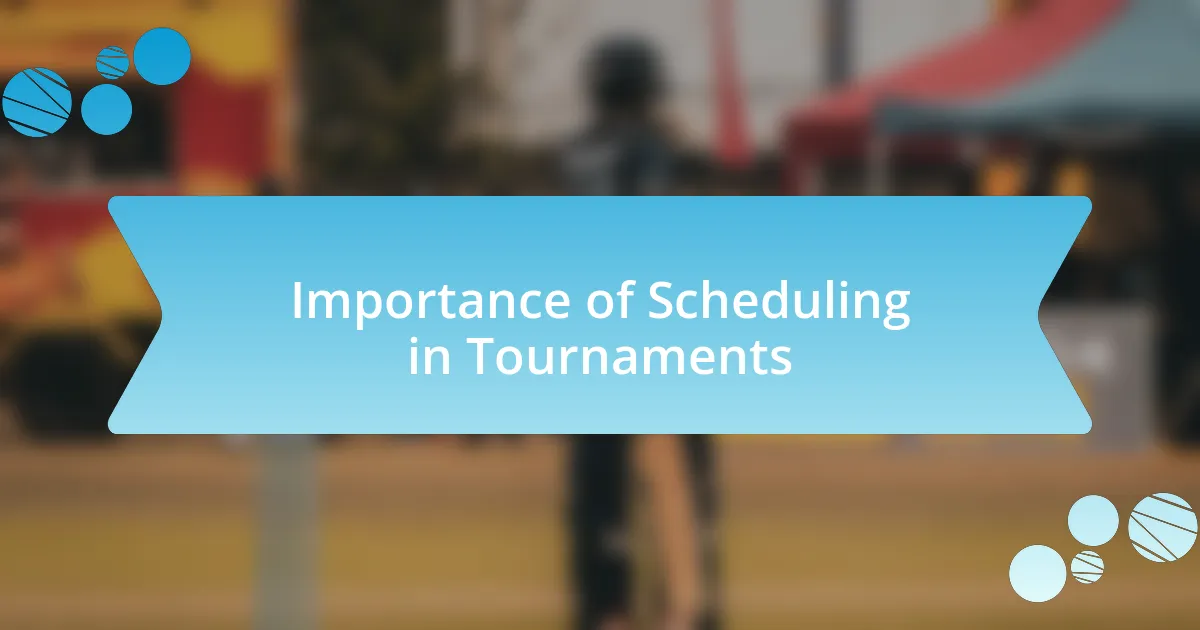
Importance of Scheduling in Tournaments
Scheduling in tournaments is essential for ensuring that each round flows smoothly and that everyone involved remains on track. I’ve often noticed that when schedules are clear, it reduces anxiety not just for me, but for everyone in the competition. During one memorable tournament, I saw how a minor delay during the initial matches led to chaos later in the day. It was a stark reminder that a well-structured timetable is crucial to sustaining energy levels and focus throughout the event.
- Establishing clear start and end times for each round helps create a rhythm.
- Allocating sufficient breaks prevents burnout and maintains peak performance.
- Communicating the schedule to all participants fosters a sense of community and cooperation.
- Adjusting the schedule as needed, while retaining transparency, builds trust and keeps morale high.
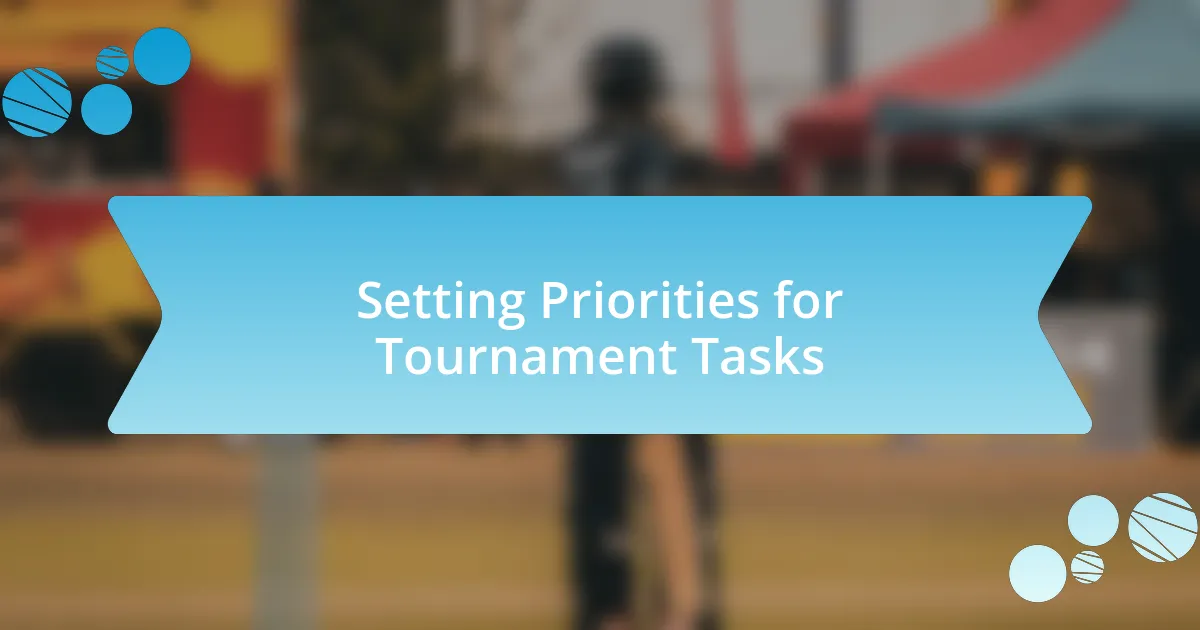
Setting Priorities for Tournament Tasks
Setting priorities for tasks in a tournament can significantly impact how efficiently the event unfolds. I remember a particular tournament where I was overwhelmed by various responsibilities, from coordinating matches to managing participant concerns. By taking a step back and assessing what absolutely needed my immediate attention – like ensuring players were lined up for their matches – I found that the event ran much more smoothly.
Understanding the difference between urgent and important tasks is crucial. For me, preparing materials for the upcoming matches always takes precedence. There was a time when I ignored this, trying to multi-task instead, and I ended up scrambling last minute. That experience taught me the value of prioritizing – it’s about focusing energy where it counts the most.
Another aspect I find vital is the need for flexibility in my priorities. Tournaments are live events, and unexpected issues arise regularly. Just a few months ago, an equipment malfunction occurred, throwing off our schedule. I quickly shifted my focus, addressing that situation, and realized how prioritizing adaptable tasks can make or break a tournament’s success.
| Task Type | Priority Level |
|---|---|
| Urgent | High |
| Important | Medium |
| Non-Essential | Low |
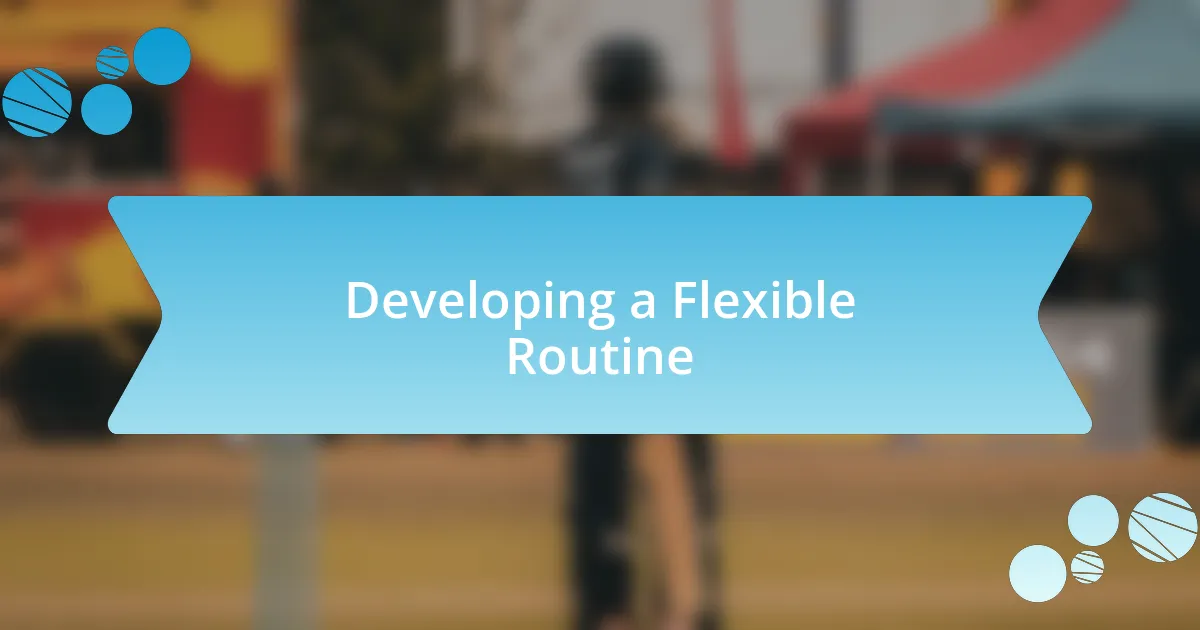
Developing a Flexible Routine
Developing a flexible routine is essential for navigating the unpredictable nature of tournaments. I’ve found that if I rigidly stick to a plan, I often miss out on adjusting to the real-time dynamics of the event. I remember once at a sprawling tournament, I had meticulously scheduled breaks, only to realize that a game was about to go into overtime. The moment taught me that staying adaptable allows me to respond to the actual flow of the tournament rather than just the agenda I had in mind.
One strategy I implement is allocating specific time blocks for various responsibilities, but I always leave extra time as a buffer. This space not only accommodates unexpected changes but also gives me a moment to breathe amidst the chaos. Have you ever noticed how when you give yourself that little extra room, it often helps you stay centered? I certainly have. After a close call with a player’s scheduling conflict, I learned that these buffers can transform stress into a manageable situation.
Additionally, I find it beneficial to take a few minutes at the end of each day to reflect on what worked and what didn’t. This habit allows me to refine my routine continuously. I can’t tell you how freeing it is to acknowledge that not everything will go as planned, but being prepared to pivot makes all the difference. In tournaments, having a flexible routine doesn’t just make the logistics smoother; it also fosters a more enjoyable experience for everyone involved.

Utilizing Tools for Time Tracking
Utilizing tools for time tracking has become one of my go-to strategies during tournaments. Whether it’s a simple stopwatch app on my phone or a more sophisticated time management tool, having these resources at my fingertips helps me stay on top of schedules. I recall a tense moment when I was juggling multiple games at once; without my timer, I might have lost track of a crucial match. The right tool brought me back to reality, allowing me to refocus on what mattered most.
I’ve also discovered the power of digital calendars with reminders. It’s like having a virtual assistant reminding me of upcoming matches or important tasks. When I first started using one, I felt a weight lift off my shoulders. I remember entering all the match times and setup intervals, and it was a revelation to see everything laid out clearly. Have you ever felt like time slips away when you’re caught up in the action? A well-organized digital calendar can anchor that chaotic feeling.
Another aspect I appreciate is the ability to analyze my time usage after the tournament. Tools that provide insights into how I spent my time have helped me identify patterns and areas for improvement. I once noticed I was spending too long on minor logistics while neglecting strategic planning sessions. This realization was a game changer. Do you ever wish you could optimize your approach to time, too? With the right tracking tools, it’s completely achievable, making each tournament experience even more rewarding.

Strategies for Staying Focused
Staying focused during tournaments is crucial, and one strategy I’ve embraced involves setting specific mental checkpoints. For me, these checkpoints serve as pauses to assess my performance—almost like mini-reviews throughout the tournament. I remember feeling overwhelmed during an intense match when my mind started to drift; taking just a moment to breathe and assess what was working helped me regain my concentration and improve my gameplay significantly. Have you ever tried pausing to refocus in the heat of competition?
Another tactic I find effective is creating a distraction-free environment. This means minimizing noise or clutter that can pull my attention away. I’m very particular about my setup; in one tournament, I went so far as to bring my own headphones, blocking out any background noise that could disrupt my focus. It may seem small, but when you’re in the zone, these little things can make a substantial difference. Have you noticed how much easier it is to concentrate when you control your surroundings?
Finally, incorporating short breaks into my schedule has made a world of difference for my focus. I used to think that powering through would help me stay sharp, but I learned the hard way that fatigue can creep in unexpectedly. Now, I take brief moments to step away, stretch, and refresh my mind. I recall one tournament where just stepping outside for fresh air revitalized my energy and focus for the next round. Can you relate to the need to recharge during long stretches of competition?
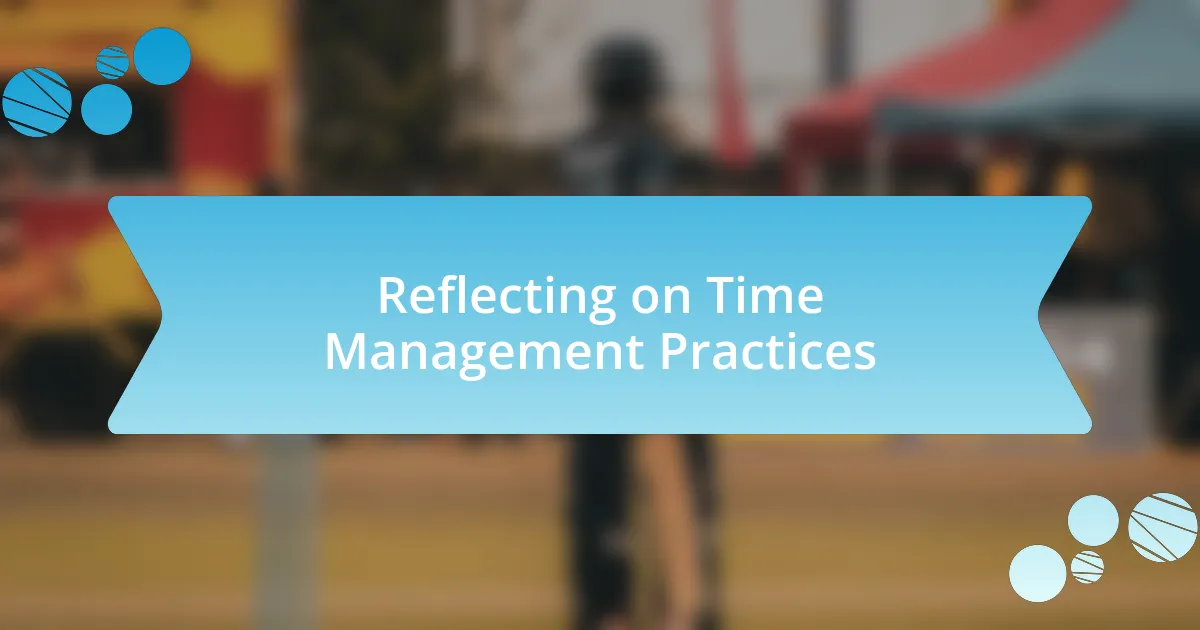
Reflecting on Time Management Practices
Reflecting on my time management practices throughout tournaments has led me to realize that awareness is key. During a particularly hectic event, I found myself constantly glancing at the clock, which only added to my stress. I learned that by checking the time less frequently and trusting that I had allocated my hours wisely, I could stay calmer and make better decisions. Have you ever noticed how managing your perception of time can impact your experience?
I’ve also discovered that reviewing my performance immediately after each round is invaluable. After one tournament, I took the time to jot down what worked and what didn’t. It felt like a game changer, as I was able to pinpoint specific time-related mistakes, such as spending too long mulling over decisions at critical junctures. This practice not only improved my efficiency but also alleviated anxious feelings during matches. Have you thought about documenting your experiences to enhance future performance?
Another realization I’ve had involves the importance of flexibility in my schedule. In past tournaments, rigid time blocks often left me feeling trapped or rushed. Recently, I’ve embraced a more adaptive approach—allowing for extra time when needed but also being ready to pivot when things speed up unexpectedly. It has led to a more relaxed mindset, enabling me to flow with the tournament rather than feel confined by it. How do you adapt when things don’t go as planned during competition?










